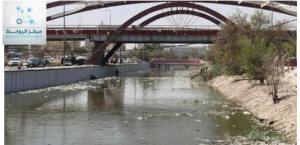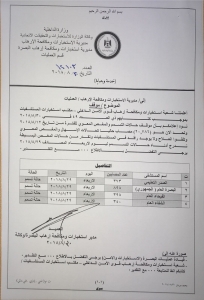Iraqi citizens of Basra suffer from the negative effects of contaminated drinking water that sweeps their city and makes them vulnerable to various diseases. In Iraq, there is a significant shortage of water because of the drought. Basra is suffering from contaminated water, salt, and lack of public services, open sewage and pollution air due to burning flares in the oil fields in the region. In Basra, sewage flows through open channels to the Shatt al-Arab. For years, residents of Basra have been complaining about the lack of water to drink or shower because of its salinity and high levels of unknown fat.
In addition, the city of Basra, which is floating on a sea of oil, suffers from power outages in the midst of a heat summer that reached more than 55 degrees Celsius at a time when drinking water is salty and unfit for drinking or agriculture. This is not just for the summer but electricity cuts are sparking protests in July each year, noting that this year’s demonstrations were the strongest and most intense, and spread to several provinces and cities south and center of the country.
The water pollution crisis began and appeared clearly on 12 August when the Director General of the Basra Health Department, Riyad Abdul-Amir, said, “We received more than 17,000 cases of diarrhea, colic and vomiting” in the province of Basra, one of the most populous provinces in the country, the only city overlooking the bay. But he warned that although “poisoning cases are benign so far and all patients are returning home, the situation is getting worse.” He added that he had not faced such a crisis for 11 years, coinciding with declining public services and rising prices. The polluted water in Basra has poisoned thousands of its people , which removes the curtain on a water scandal due to the extraordinary rate of pollution in the drinking waters in the Iraqi province. The unprecedented poisoning caused overcrowding in the province’s hospitals over the past few days. In this context, Rawabet Center for Research and Strategic Studies has received an official letter issued by the Ministry of the Interior confirming the occurrence of more than 20 thousand cases of poisoning and intestinal colic and diarrhea in the period between 12 to 29 August of the same month.
It is painful and sad that the city of Basra deserves much attention and care. This city is located on the Shatt al-Arab River in southern Iraq between Kuwait and Iran, and is the only maritime port in Iraq through the port of Umm Qasr. Basra played an important role in early Islamic history. It was built in 636. Basra shares an international border with Saudi Arabia and Kuwait to the south,and Iran to the east , and the local borders of Basra province shares with provinces ThiQar , Misan and Muthana , Basra is the third city in Iraq after Baghdad and Mosul. It is about 67 km from the Arabian Gulf and 549 km south of Baghdad. Its population is estimated at 2,600,000 and its total area estimated at 19070 square kilometers according to the latest statistics of the Central Bureau of Statistics of the Iraqi Ministry of Planning in 2003. It is the second largest city in Iraq and is the only port of Iraq and the largest maritime outlet.
It is the Fayhaa of Iraq and the source of its wealth, the city lies in the oil region which is one of the richest in the world, Basra includes the bulk of the Iraqi oil reserves discovered so far, and the total oil fields in the city amounted 15 oil fields, 10 of which are producing and in operation , the other five oil fields are still waiting for investment and development, the total oil reserves in Basra are estimated by 65 billion barrels, a percentage close to 60% of the Iraqi oil reserves, and the most prominent fields of the city of Basra:
The northern Rumaila field, the giant of the Iraqi fields, extends over a large area of Basra to the north and to Kuwait in the south, but the bulk of it is located in Iraq, the ninth largest oil field in the world, and includes the best oil layers, and now includes more than 663 Productive well.
Another field of no less importance than the previous one is the Majnoon field, which is named by this name for its abundant oil, a giant field that temporarily produces about 100,000 barrels per day, although its production capacity could reach 600,000 barrels per day if invested.
West Qurna Field , this field represents the northern extension of the northern Rumaila field, which is believed to contain a stockpile of at least 24 billion barrels.
The field of the River Omar, a large oil field has many undeveloped reservoirs, and production is still modest; it is about one thousand barrels per day, and the capacity after the development to 500 thousand barrels per day.
Other fields are no less important than the previous ones: the southern Rumaila field, the Zubayr field, the Loheis field and the Al-Tuba field.
Studies published in 2015 indicate the international economic importance of oil in Basra. It has a huge oil reserves that exceeded the reserves of many OPEC countries, Caspian countries (excluding Iran) and the North Sea combined countries, as well as its large production, which accounts for about 65% of Iraq’s production of crude Oil. The study also indicates that the process of extracting oil in Basra is characterized by low cost of production, it is the least cost on the global scale; the oil and gas fields in Basra are located on land, and very close to the surface of the earth, in addition to being economically feasible because of the size Large reserves, and large stocks, as well as – fields – they do not include complex geological formations that facilitate the extraction process.
As for Basra’s agricultural resources, foremost of which are palms, the talk about palms is a talk about the past, not the present. The number of palm trees in Basra in the late 1970s reached about 22 million palms, but this number has declined so that today no more than million tree palm is, The reason is the ongoing wars and the economic siege, that this destruction suffered by Basra left a negative impact on the Iraqi economy in general and Basra citizen in particular , in addition to the fact that dates are food, it enters into many food industries in addition to the resources exported abroad, and in addition to the date palms , there are numerous food resources such as tomato crop which it feeds the rest of Iraq, although this crop is based on the personal efforts of individuals rather than the state , how it would be if the state showed interest in it and livestock comes as an important economic source such as sheep , buffalo and camels as well as birds in the marsh areas.
As for the maritime wealth, it is the wealth that is characterized by Basra, where it overlooks (60) km on the coast of the Arabian Gulf, in addition to the Shatt al-Arab and to meet the rivers Tigris and Euphrates, and hundreds of small rivers scattered in the city of Basra. Its maritime importance is evident by being the only outlet on the Gulf and the world, contributing to the issue of maritime transport in addition to water resources, fish, minerals and pearls deep in the sea and others, and also the Marshlands of Basra formed economic resources at the level of agriculture and livestock, fish and birds in particular.
In spite of these huge resources for the city of Basra, but it has seen a significant increase in poverty rates from 2007 to 2011, while there are no statistics for the years after 2011, but indicators indicate that the levels of poverty and unemployment and lack of job opportunities for university graduates are growing and growing in Basra with high levels of oil exports of the province itself.
I cry on the Balm pith of Basra and figs…
I cry on it, who among you comfort me…??!
I cry over her people and death reaps them
Until its land became a refuge for Ezrin(humiliation) …
Basra today asks water and I regret…!!
And the ruler’s lives as the Sultans lived their lives
Where are the first men who told us that we have
Free homeland and happy people, who will give me a fatwa,?!!
Peace and cool on my Basra…
To be kept a way from all evil.
Iraqi Studies Unit
Rawabet Center for Research and Strategic Studies


